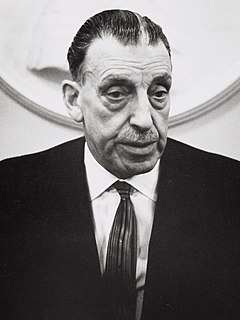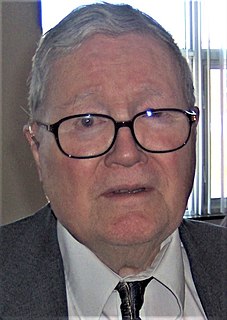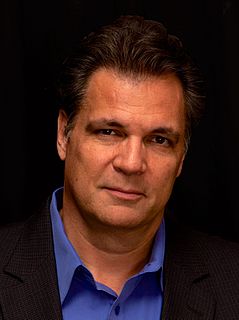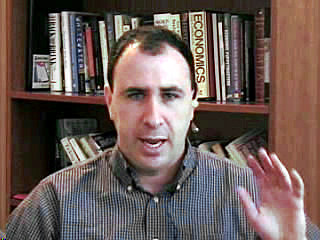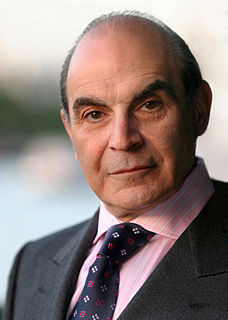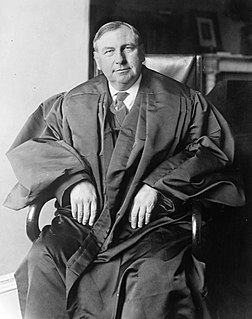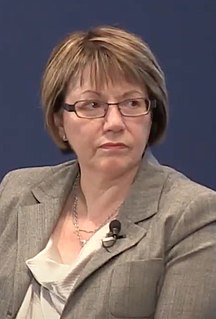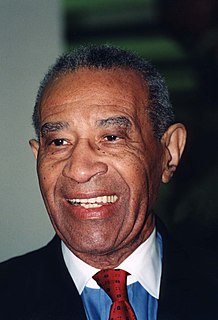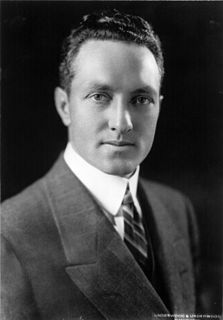Top 1200 Public Quotes & Sayings - Page 20
Explore popular Public quotes.
Last updated on April 22, 2025.
The liberal appropriations made by the legislature of Kentucky for a general system of education cannot be too much applauded . . . . Learned institutions ought to be the favorite objects with every free people. They throw that light over the public mind which is the best security against crafty and dangerous encroachments on the public liberty . . . . What spectacle can be more edifying or more seasonable than that of liberty and learning, each leaning on the other for their mutual and surest support?
The first generation of school reformers I talk about - nineteenth century education reformer Horace Mann, Catharine Beecher - they are true believers in their vision for public education. They have a missionary zeal. And this to me connects them a lot to folks today, whether it's education activist Campbell Brown or former D.C. public schools chancellor Michelle Rhee. It's a righteous sense, a reform push that's driven by a strong belief in a particular set of solutions.
[The] erroneous assumption is to the effect that the aim of public education is to fill the young of the species with knowledge and awaken their intelligence, and so make them fit to discharge the duties of citizenship in an enlightened and independent manner. Nothing could be further from the truth. The aim of public education is not to spread enlightenment at all; it is simply to reduce as many individuals as possible to the same safe level, to breed and train a standardised citizenry, to put down dissent and originality.
RTE was set up by legislation as an instrument of public policy, and, as such is responsible to the government. The government have overall responsibility for its conduct, and especially the obligation to ensure that its programmes do not offend against the public interest or conflict with national policy as defined in legislation. To this extent the government rejected the view that RTE should be, either generally or in regard to its current affairs programmes, completely independent of government supervision.
A much more radical conclusion . . . that, so far as I know, is shared by only a very few students of public choice [is]: that government employees or people who draw the bulk of their income from government by other means should be deprived of the vote . . . It is another example of the opening up of alternatives for investigation and the presentation of new conceivable policy options characteristic of public choice, rather than a policy that all its students favor.
The ideal of having a real job that you risk your soul in and make good or be damned, belongs to the heroic age of capitalist enterprise, imbued with self-righteous beliefs about hard work, thrift, and public morals. Such an ideal might still have been mentioned in public fifty years ago; in our era of risk-insured semimonopolies and advertised vices it would be met with a ghastly stillness.
There is a schizophrenic nature in modern politics. A leader is expected to have a religious faith but he is not supposed to let it influence him in his duties. Somehow, the truths that determine everything else about his existence are not allowed to influence how he conducts himself in public life. Not only that, his principles are usually considered so personal that the public is not even allowed to know for certain what they are. This passes for noble statecraft in our time. It was once thought cowardice.
They are wrong who think that politics is like an ocean voyage or a military campaign, something to be done with some particular end in view, something which leaves off as soon as that end is reached. It is not a public chore, to be got over with. It is a way of life. It is the life of a domesticated political and social creature who is born with a love for public life, with a desire for honor, with a feeling for his fellows; and it lasts as long as need be.
Here's what people should look at as they look at a public servant. Do they have a passion in their life that showed up before they were in public life? And have they held onto that passion throughout their life, regardless of whether they were in office or not, succeeding or failing. Hillary Clinton has that passion, from a time as a kid in a methodist youth group in the suburbs of Chicago, she has been focused on serving others with a special focus on empowering families and kids.
The reflection and experience of many years have led me to consider the holy writings not only as the most authentic and instructive in themselves, but as the clue to all other history. They tell us what man is, and they alone tell us why he is what he is: a contradictory creature that seeing and approving of what is good, pursues and performs what is evil. All of private and public life is there displayed. ... From the same pure fountain of wisdom we learn that vice destroys freedom; that arbitrary power is founded on public immorality.
Charles Bernstein's pairs of jingles of 'public discourse' are 'simultaneous double narrative / the space between's the other narrative/as if they're opposite.' In the space between, outside representation but in the 'presence' of it, we are provoked to laugh. Bernstein alters our language to open a double range that's public and mind at once and inseparable, that is 'Poetry is patterned thought in search of unpatterned mind.' Girly Man is doing it.
You'll have to have the governments sell off all of their public domains; sell off their railroads, sell off their public land. You'll essentially have to introduce neo-feudalism. You'll have to roll the clock of history back a thousand years, and reduce the European population to debt slavery. It's as simple a solution as the Eurozone has imposed on Greece. And it's a solution that the leaders and the banks are urging for responsible economists to promote for the population at large.
People who thought that she was busy going around trying to stir up difficulty where there was none or less than she imagined, were quite critical of her. She was, we must never forget, a public figure. And in democracies, public figures tend to attract criticism as well as praise. The most dangerous thing would be if anybody were regarded as above criticism. And Eleanor Roosevelt is, in recent years, getting there.
There is a connection, hard to explain logically but easy to feel, between achievement in public life and progress in the arts. The age of Pericles was also the age of Phidias. The age of Lorenzo de Medici was also the age of Leonardo da Vinci. The age of Elizabeth was also the age of Shakespeare. And the New Frontier for which I campaign in public life, can also be a New Frontier for American art.
During the last 35 years, the artists multiplied, the public grew enormously, the economy exploded, and so-called contemporary art became fashionable. All these parameters changed the art world form its previous aspects and fundamentals - the explosion of museums and institutions, explosion of Biennales and Triennials, explosion of money, explosion of interest, explosion of artists, explosion of countries interested in contemporary exhibitions, explosion of the public. Not to see that is to be more than blind.
The path to a better future goes directly through our public schools. I have nothing against private schools, parochial schools and home schooling, and I think that parents with the means and inclination should choose whatever they believe is best for their children. But those choices cannot compete, and cannot come at the expense of what has been -- and what must always be -- the great equalizer in our society, a free and equal public education.
For three decades and longer we have been developing the ideas, science, and technological wherewithal to build a sustainable society. The public knows of these things only in fragments, but not as a coherent and practical agenda indeed the only practical course available. That is our fault and we should start now to put a positive agenda before the public that includes the human and economic advantages of better technology, integrated planning, coherent purposes, and foresight.
Because many people remembered a time when the Republican Party was not so extreme, and hadn't full grasped how much it had changed, people blamed Obama for his failure to get Republicans to agree with him. That blame coloured so much of how the public saw Obama during his presidency. The public thought he was dealing with a brand of Republican leader that just didn't exist any more.
I think the record-buying public know what they like, and when people are trying to pander to them, I think they know it. They want the genuine article, so if we try to sort of "dumb down" for the mass public, I think they're too smart for that, and would recognize us as fakes. It seems like the bands that do crossover do so really on their own terms, and they just find that their terms just kind of make a big dove-tail with the masses.
Public taste changes and the aesthetic of a culture changes over time, so the idea isn't to appeal to the aesthetic of the moment and what people will like right now; the idea is to somehow keep yourself in the public memory so that as taste evolves it will eventually come to embrace your thing. So, it's about writing to be remembered rather than writing to be liked.
I love seeing my characters big up there and I would have liked to have reached a different public in movies from my television public. There's still a part of me that wishes that my character range could be seen on the big screen. Rather, as Rod Steiger was, because he was a big influence on me - about becoming other people and not worrying about your own glory or self esteem but sacrificing yourself to become somebody else.
In the 1960s, various parts of the population became energized and began to enter the public arena to call for the rights of women, students, young people, old people, farmers and workers. What are called "special interests" - meaning the whole population - they began to press to enter the public arena. And they said that puts too much pressure on the state and therefore we have to have more moderation in democracy and they should go back and be quiet and obedient.
But it is recognized that punishment for the abuse of the liberty accorded to the press is essential to the protection of the public, and that the common law rules that subject the libeler to responsibility for the public offense, as well as for the private injury, are not abolished by the protection extended in our constitutions. The law of criminal libel rests upon that secure foundation. There is also the conceded authority of courts to punish for contempt when publications directly tend to prevent the proper discharge of judicial functions.
Brian Walker and David Salt have written a thoughtful and powerful book to help resource users and managers put resilience thinking into practice and aim toward increasing the sustainability of our world. I urge public officials, scholars, and students in public policy programs to place this volume on their list of must-read books. It is a powerful antidote to the overly simplified proposals too often offered as solutions to contemporary problems at multiple scales.
If you're working on better conditions for prisoners, if you make that a popular issue and you invite mainstream media to weigh in on that subject, you're going to end up with a much more regressive public-policy environment than if you approach it in a quieter way. It's not because the public is stupid, it's just that people with only a cursory interest in something are going to have a knee-jerk reaction to it. That's impossible to explain in a cable-news media... it doesn't make sense.
For A to sit down and think, What shall I do? is commonplace; but to think what B ought to do is interesting, romantic, moral, self-flattering, and public-spirited all at once. It satisfies a great number of human weaknesses at once. To go on and plan what a whole class of people ought to do is to feel one's self a power on earth, to win a public position, to clothe one's self in dignity. Hence we have an unlimited supply of reformers, philanthropists, humanitarians, and would-be managers-in-general of society.
Friends told me that the latest trend, at least in Europe, is public sex. They showed me some clips, and they're terrifying. A couple enters a streetcar, half-full, simply takes a seat, undresses, and starts to do it. You can see from surprised faces that it's not staged. It's pure working-class suburb. But what's fascinating is that the people all look, and then they politely ignore it. The message is that even if you're together in public with people, it still counts as private space.
Secularists are wrong when they ask believers to leave their religion at the door before entering into the public square. Frederick Douglass, Abraham Lincoln, Williams Jennings Bryan, Dorothy Day, Martin Luther King - indeed, the majority of great reformers in American history - were not only motivated by faith, but repeatedly used religious language to argue for their cause. To say that men and women should not inject their "personal morality" into public policy debates is a practical absurdity.
To cover the fact that a central bank is merely a cartel which has been legalized, its proponents had to lay down a thick smoke screen of technical jargon focusing always on how it would supposedly benefit commerce, the public, and the nation... there was not the slightest glimmer that underneath it all, was a master plan which was designed from top to bottom to serve private interests at the expense of the public... the system is merely a cartel with a government facade.
Public lives are lived out on the job and in the marketplace, where certain rules, conventions, laws, and social customs keep most of us in line. Private lives are lived out in the presence of family, friends, and neighbors who must be considered and respected even though the rules and proscriptions are looser than what's allowed in public. But in our secret lives, inside our own heads, almost anything goes.
The class of citizens who provide at once their own food and their own raiment, may be viewed as the most truly independent and happy. They are more: they are the best basis of public liberty, and the strongest bulwark of public safety. It follows, that the greater the proportion of this class to the whole society, the more free, the more independent, and the more happy must be the society itself.
This government does not believe that public safety is enhanced by carrying weapons. In fact, it has been a long-standing Canadian government practice to discourage the use of personal defence weapons. Once public possession of one type of weapon is condoned for personal defence, the situation of weapon possession for protection starts to spiral upwards towards more powerful and dangerous weapons.
We have voluntarily agreed to let an invisible government sift the data and high-spot the outstanding issues so that our field of choice shall be narrowed to practical proportions. From our leaders and the media they use to reach the public, we accept the evidence and the demarcation of issues bearing upon public questions; from some ethical teacher, be it a minister, a favorite essayist, or merely prevailing opinion, we accept a standardized code of social conduct to which we conform most of the time.
The general public doesn't know and probably doesn't care about punctuated equilibria nor indeed should they, or the greenhouse effect on some other planet - they barely have the ability to cope with the greenhouse effect on their own planet. So I think you have to distinguish between the broad visibility of a scientist when he or she is speaking to a general public and trying to address general issues and the continued position that a scientist may have into the history of a particular subject.
My general impression about people like Steve Gould and Carl Sagan and so on is that when they disappear as individuals and are no longer appearing on the stage and they are no longer writing, that their lifetime of acknowledgement by the general reading public is not very long... There were many people in the 19th century who were equally famous people who gave working man's lectures, supporters of Darwin, we as scholars know their names but the general public never heard of them.
In a Society in which there is no law, and in theory no compulsion, the only arbiter of behaviour is public opinion. But public opinion, because of the tremendous urge to conformity in gregarious animals, is less tolerant than any system of law. When human beings are governed by "thou shalt not", the individual can practise a certain amount of eccentricity: when they are supposedly governed by "love" or "reason", he is under continuous pressure to make him behave and think in exactly the same way as everyone else.
The problems that exist on Wall Street today go to the center of a debate in this country about wealth and democracy. We cannot keep our democracy if those who are in charge of handling the engines of our economy are not honest with their shareholders. That's why there is a role for government regulation here. That role for government is breaking up the monopolies, insisting on public disclosure, insisting on public audits, insisting on restitution whenever someone has been cheated.
A lot of abstract painters seem to be doing everything all at once now. And so these different styles are jibing and not so jibing, and they're clashing. But they all seem to be working in their own domain. Whereas back in the '60s, man, it was kind of a dull world. It was a vital world. But it was kind of contained and not too recognized by the public. Now art is absolutely recognized by the public.
He that hath wife and children hath given hostages to fortune, for they are impediments to great enterprises, either of virtue or mischief. Certainly the best works and of greatest merit for the public have proceeded from the unmarried or childless men, which both in affection and means have married and endowed the public. He was reputed one of the wise men that made answer to the question, when a man should marryA young man not yet, an elder man not at all.
I used to take musical instruments home from elementary school. There were some music teachers there - we all learned instruments. A lot of us got started in public schools. Charlie Parker and Bud Powell, for example. But now there are no more music teachers in public elementary schools. It's like (Senator) Moynihan said, 'benign neglect.' Just let it rot and fester.
It is said that the fear of public speaking is a fear greater than death for most people. According to psychiatrists, the fear of public speaking is caused by the fear of ostracism, the fear of standing out, the fear of criticism, the fear of ridicule, the fear of being an outcast. THE FEAR OF BEING DIFFERENT PREVENTS MOST PEOPLE FROM SEEKING NEW WAYS TO SOLVE THEIR PROBLEMS.
What people think about you is not supposed to matter much, so long as you yourself know where the truth lies; but I have found out, as have others who move in and out of newspaper headlines, that on occasion it can matter a good deal. For once you enter the world of headlines you learn there is not one truth but two: the one which you know from the facts; and the one which the public, or at any rate a highly imaginative part of the public, acquires by osmosis.
Facebook's a wonderful, incredible way to bring humanity together. They've brought together 2 billion people in the largest fictional family in history. So young people are starting to empathize with each other through Facebook across the globe. This is wonderful. However, when everyone needs Facebook because it's so successful that everyone's on it, then it starts to look like a global public utility, a public good. Same with Amazon.
I think corporations should give more attention to this suffering and should wait to invest until there is a responsible government in Burma. I do not think it is a good idea to separate economics from politics; in fact, I do not think economics can be separated from politics It's quite understandable that many business concerns think only about their own profits It's up to the public to put as much pressure as it can on these companies, through shareholder resolutions and public actions.
The 'public' is a phantom, the phantom of an opinion supposed to exist in a vast number of persons who have no effective interrelation and though the opinion is not effectively present in the units. Such an opinion is spoken of as 'public opinion,' a fiction which is appealed to by individuals and by groups as supporting their special views. It is impalpable, illusory, transient; "'tis here, 'tis there, 'tis gone"; a nullity which can nevertheless for a moment endow the multitude with power to uplift or destroy.
For the corporation executives, the military metaphysic often coincides with their interest in a stable and planned flow of profit; it enables them to have their risk underwritten by public money; it enables them reasonably to expect that they can exploit for private profit now and later, the risky research developments paid for by public money. It is, in brief, a mask of the subsidized capitalism from which they extract profit and upon which their power is based.
If you go to go to countries in Europe or Asia or even Canada, even with all the Internet and cable TV and satellite, public systems tend to be the most popular stations in the countries. In some countries like Norway and Germany, public stations are, if anything, more popular than ever as people see what Rupert Murdoch's got in store for them in the commercial stations.
Anything that I'm doing I think I always come at it from an outsider perspective. The first like real front page story that I had for the Times was about how after decades of battles over public restrooms in New York City, effectively chain stores had become the public restroom of choice for New Yorkers, it's sort of a silly little thing, but coming as an outsider, I was like 'Oh this is actually really interesting.'
This wasn’t just an attack against the Boston Marathon... It was an attack against the American public and our democratic use of the streets. We have used our public roadways for annual parades, protest marches, presidential inaugurations, marathons, and all manner of other events. The roads belong to us, and their use represents an important part of our free and democratic tradition.
In Australia’s biggest cities, public transport is generally slow, expensive, not especially reliable and still hideous drain on the public purse. Part of the problem is inefficient, overmanned, union-dominated government run train and bus systems. Mostly though, …there just aren’t enough people wanting to go from a particular place to a particular destination at a particular time to justify any vehicle larger than a car, and cars need roads.
We were very effective, and I was very effective, in shaping public opinion around my campaigns. But there were big stretches, while governing, where even though we were doing the right thing, we weren't able to mobilize public opinion firmly enough behind us to weaken the resolve of the Republicans to stop opposing us or to cooperate with us. And there were times during my presidency where I lost the PR battle.
I've been very reluctant on the Twitter front. But I do Instagram now, so I'm slowly coming around. I'm quite a private person, so much of what I do for my job means that I have to be quite public so I'm just nervous about everything being public. I might turn around. Three years ago, I was against all social media but I actually really enjoy Instagram now. Who knows? I never say never!
I guess I am nostalgic for a time - the nineteenth century and early twentieth - when writers were, to use Stefan Collini's phrase, "public moralists" and politicians, plutocrats, bankers, arms dealers, and experts and technocrats were not solely defining the moral norms as well as the political lives of our societies. We do have some writers claiming to be public moralists, but, as I said, they have actually been more jingoistic than even the henchmen of Bush and Blair.



